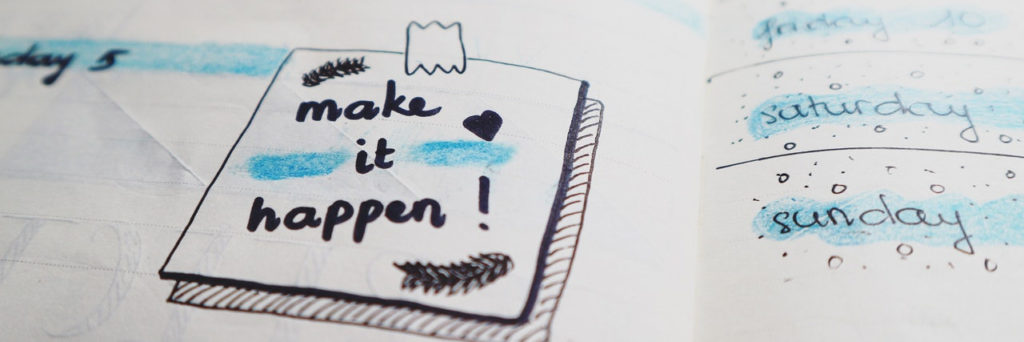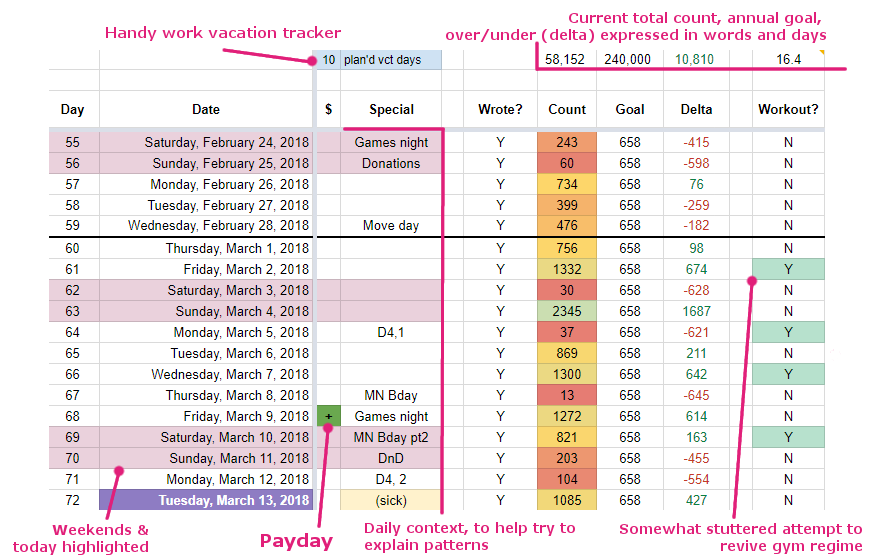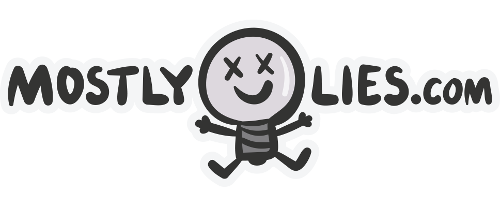My personal mantra and recipe for success is: patience, perseverance, process, passion.
But to simplify for the purposes of getting started with self-publishing, I’ll say you need to lock three things down:
- Goals
- Resources and tools
- Routine and disclipline
Practical self-publishing goals

I might argue that it doesn’t matter what they are, as long as you have them and they’re reasonable. But if you’re only starting out, I’ll boil it down to the only things that really matter at the beginning.
- Number of words that you write
- Number of titles you ship (aka publish)
Editing doesn’t count, time spent futzing with the website doesn’t count, research doesn’t count, sales volume does not count.
All of it is important, yes, but my advice is to focus on the two numbers that relate most intimately to the job of self-publishing. If all else fails, cater to one, if not both of those. It will mean your first few books may be utter trash and have terrible colours and earn you not one red cent. That’s fine, because you’re 95% ahead of the pack of people who flirt with the notion and never get anywhere because they’re caught in a spiral of self-doubt, procrastination, intimidation, etc.
Figure out how many words you type an hour, when your writing is flowing smooth. Multiply it by 10. That’s a decent two week goal for word count, assuming you can find 20 hours a week to work on self-publishing (you almost certainly can). Ten hours of average writing speed per week, with another ten hours to buffer for slow days, life, those other things that matter but do not count towards the goal, etc. Even if you’re a slow writer at 200WPH, that’s 52,000 words a year using the math above, which is technically a novel (40,000 words is the lowest bound for the classification of a novel).
As for titles, all I know is more is almost always better. Your volume of titles will be determined by your word output and the kind of stuff you decide to publish. When you’re starting off, unless you’re an absolute machine, my advice would be to focus on the first title. Get one out there first before you stress about how you’re not blasting out a dozen. As the process becomes more comfy and less mystifying, you can ease into setting more prolific goals. When I wrote this sentence, I had 11 eBooks and 2 paperbacks, and a few eBooks were only partial pieces of a complete eBook. I still don’t expect any of them to sell anything unless I amp up marketing and review hunting (currently: 0 reviews, a major roadblock that I know I must tackle but am not freaking out about). I started either 2 years ago or 4 years ago, depending on the criteria.
As mentioned earlier, it can take some time. Hats off to those who catch the magic viral elevator. For the rest of us, it’s the stairs. We’ll get to where we’re going, don’t worry.
To summarize your beginner goals:
- Words. Based on your average writing speed, set a time bound quota. Weekly, monthly, daily–whatever works best for you.
- Titles. If you’ve never done it before, your goal is one. See if you can manage it in the next six months.
Self-publishing resources and tools

There are vast number of helpful things out there, and this whole Self Pub Hub’s mission is to corral and organize them. But for your starter kit, the bare bones essentials are:
- Something that can digitize your words. I recommend the cheapest little PC you can find. Not a Chromebook, as I lovingly used for some time (see points 4-5)
- Internet access (duh)
- An Amazon account, (and eventually, personal tax information that allows you to sell via Amazon)
- An image manipulation program, such as the free GIMP (does not run on Chromebook)
- Scrivener, or something similar that isn’t Microsoft Word or Google Docs (does not run on Chromebook)
- Kindle previewer tool (probably does not run on Chromebook)
Now, if you’re not planning on the Amazon route (maybe you’re set on a serial style publisher like Radish or Channillo) then you could very well make do with tools #1 and #2, as well as the sleek and clutter-free Chromebook. I’ve yet to deeply explore alternate publishing avenues, and my instinct is that having the baseline understanding of Amazon’s KDP is important, so long as it remains the incumbent eBook company.
The image manipulation program is optional, and if the idea of using any kind of drawing or visual art program sounds like a nightmare, then by all means skip it. But if you’re even a tiny bit competent (or don’t mind investing in learning), having this tool at hand can save a metric crapton of time when tinkering about with covers or any other supporting graphics.
Scrivener is also not strictly necessary, nor is it free ($100 or so). But there’s a reason many writers refuse to go back to Word (or similar) once we get a taste of a program designed for us. The real magic is in the compiler, which formats your words into print-ready PDF or eBook files (MOBI, EPUB). The formatting phase can still be a major blocker for those who simply do not know how to technically (and properly) convert their words into the correct file type. Lots of small companies and entrepreneurs still make decent coin charging hapless technophobes to do this work for them. Trust me, it’s worth the one time Scrivener fee and however many hours of learning to use the compiler than shelling out for someone to press a few buttons for you.
Kindle previewer is free, and simply allows you to get a quick look at what one of your eBook files should look like across a bunch of Kindle products. This tool goes hand in hand with learning the compilers. To this day, I’ll still usually mess something up along the way of formatting (left out a chapter, forgot to bold my chapter headers, whatever) and this handy little guy usually helps me catch it before I go live.
So, once you have your goals and your basic tools set about you, it’s time to starting doing.
Self-publishing routines and discipline

This, dear Writer, is the crux of it. All the tools and the goals in the world won’t matter a lick if we don’t sit our asses down and fuckin’ write, hey? Unpacking the deep details of routine, process and discipline will be the job of the Self Pub Hub’s eventual ‘Hustle Mindset’ section, so if you want to go down the rabbit hole, there’s your invitation.
For this post: a condensed and somewhat concise overview of the key parts.
First: forget motivation.
Motivation is bullshit. If you sit around and wait for the right mood or the right idea, you’re not respecting your word count goal, or yourself. You must forcibly learn how to regularly get past whatever demonic form your writer’s block takes. When you decide to be a self-publisher, writing is no longer a hobby. It’s a job. It’s a job you hired you for. And if you treat it like a hobby that’s just for fun, the Hard Truths will steamroller over you and you’ll be back to square one time and time again. The core skill is learning how do to something when you don’t feel like doing it, rather than waiting until you do feel like it. Writing, even for someone who loves it, is not exempt.Example: right now, I am starting to get sick. I got home from work feeling weary. I wanted to nap and maybe get a few extra hours of sleep in hopes of killing off the bugs quicker. But since I adhere to the No Zero Days starter routine below, I opened up the computer and committed to typing at least one word. I figured it’d probably be more like 15-20 words since it’s not difficult to bash out a sentence. It ended up being closer to 100… then habit kicked in. A few hours later, and the counter at the bottom says 1,426: I wrote this and all the words above from a seedling commitment of 1 word or more.
Second: develop a writing routine.
Any will do. Here’s two starter ones to chew on:- No zero (word) days
- Butt in chair
No Zero Days is a broader philosophy that is amazing for life in general. Core tenets are here. For us, it’s a simple promise: you will write at least one word a day. You will also keep track of your daily word count. (I also recommend you math out your daily word count goal from above and arrange it all in a lovely spreadsheet.) If you commit to the simple promise, I can almost guarantee you’ll eventually experience the “seedling” phenomenon I am literally in the middle of while writing this, as described above.
Here’s a sample of my sheet. (Online sample sheet coming soon.)

As far as No Zero Days is concerned, the most important column in that fancy pants thing above is the one that says ‘Wrote?’
If it’s a Y, then all’s well.
Butt in Chair is slightly more advanced version of No Zero Days, that demands you pick a duration of time, say two hours. You commit to sitting your butt in your writing chair for two hours per day, no matter what. No. Matter. What. If you do nothing but stare maddeningly at a blank page for two hours, so be it. But you must sit.
The principle is effectively the same: a discipline and regime that you cultivate until it becomes a productive habit. Despite the very organized looking vibe of the spreadsheet above, I am not an organized person by nature, and finding two hour time blocks that are not in the deep night can be a challenge. So I stick to the No Zero Days idea and the two hour time blocks usually come and find me. Often, they spawn into crazy chains of two hour blocks and before you know it it’s 1am and I have to hit the brakes and get to bed.
Third: incubate your publishing routine.
There’s a lot to learn about how often, where, when and why to actually put titles out there.When you’re starting off, only worry about the goal of getting the first crappy probably-less-than-perfect one up on Amazon or similar. Focus on the making of words.
To successfully incubate, however, you should take a few hours out of that ~20 per week to peruse what research or ideas you can on the topic. The fun thing about self-publishing is that it’s fast and changing constantly, but this also poses a bit of a problem. For example, since you’re going to be your own marketer, it’s up to you to know where your genre (if you’re in one) sits amidst the totem pole of demand and popularity.
Part of my hope with this site is to help navigate the jungle of information, or at least point you toward the best wellsprings of up to date information.
There are tons of free communities out there which you can join and lurk (or participate) in the forums, where many traditional, self-pubbed, hybrid and hopeful writers congregate and share information. You can also subscribe, for a reasonable fee, to something like The Hot Sheet, which delivers a robust chunk of industry news to your email. I recently signed up for them, and the first thing they sent me had a ton of great information, including advice around avoiding a certain platform (which shall remain nameless) in specific context.
Here are some other communities to consider joining:
- Reddit’s writing, self-pub and writing prompt subs. Reddit is an enormously important resource for any entrepreneur. It takes some getting used to and there are vast swatches of unregulated bullshit to be wary of, but for the most part, I’d argue that Reddit is the most powerful online hub of communities operating in the English speaking world today.
- CritiqueCircle. This place is a must have for any self publisher. Paid membership is optional, but 300% worth it. More on this later.
- Wattpad. The forums here tend to skew younger, but it can be an excellent place to read the pulse of younger readers. You can also self-publish here, but there’s no revenue model (yet).
- Many other forums have writing subforums, and there’s a huge constellation of communities for niche fanfic.
In Summary
To get started, you should set a word count and title publishing goal. Then, make sure you’re armed with tools that work. Learn how to use those tools, especially the formatting compiler that will convert your words into the proper electronic files. But most importantly, you must ditch the idea that this is a fun little hobby. Commit to making it a part time job, at least. Find 20 hours a week through whatever sacrifices are less important than your dream. Work on finding a rhythm and start making words, while carving off some time to make sure you’re always learning about the self-publishing landscape. Write down your progress.It’s both deceptively easy (just write things and upload ’em) and surprisingly hard.
But if it’s what you really want, then it’s there for you to take.
Happy writing.
This post was last updated April 4, 2018
